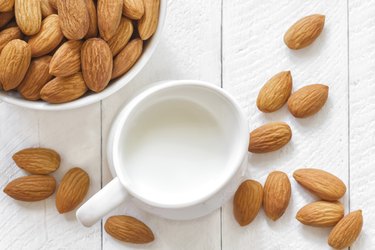
Going vegan or suffering from lactose intolerance or a dairy protein allergy doesn't mean you can't bake your favorite treats — you just have to get creative with some plant-based alternatives, like almond milk. As well as touting some health benefits, almond milk is a dairy- and gluten-free alternative that's simple to bake with.
Find out the best ways to substitute in almond milk in dessert recipes, the benefits of doing so and how to make your own almond milk at home.
Video of the Day
Video of the Day
Can You Substitute Almond Milk for Milk?
Using almond milk in baked goods is easy — simply substitute almond milk for cow's milk in the same quantity. So you'll want to aim for a one-to-one ratio.
"I have been using almond milk as a replacement for milk in baking and other dishes for quite some time and love the outcomes," says global master chef Karl Guggenmos, senior culinary advisor at Healthy Meals Supreme.
It's possible that using almond milk will decrease the baking time, says Carol Aguirre, LDN of Nutrition Connections. Check for doneness five or 10 minutes before the recipe's estimated bake time.
Almond milk has a thinner consistency than dairy-based milk, so if you're making a custard or pudding, you might want to add a few tablespoons of a thickening agent, such as flour or cornstarch, recommends Aguirre.
Benefits of Almond Milk
For the 65 percent of the population who have lactose intolerance, almond milk is a great option. "Almond milk is naturally rich in several vitamins and minerals, especially vitamin E," Aguirre says.
It's also a solid milk substitute if you're looking to cut calories: One cup of almond milk has 36.6 calories (compared to 83 calories in one cup of skim milk), according to the USDA. Plus, almond milk has no cholesterol.
The almond milk you'll find in stores is usually fortified, which helps boost its nutritional value. "Typically [enriched versions] include added vitamin D, calcium and protein, making them more like regular milk in nutritional content," says Aguirre. The calcium is particularly important for people transitioning away from dairy products, and Aguirre suggests looking for a brand that boasts over 200 milligrams of calcium per cup.
Before purchasing almond milk in stores, check the nutrition facts label. "Not all almond milk is the same," warns Aguirre, adding that some picks may have a far higher number of calories. "Opt for the unsweetened varieties, preferably original or natural vanilla flavor because sweetened and flavored almond milk can add a lot of unnecessary calories and carbohydrates." Seek out options that list zero grams of sugar per serving and do not contain any sweeteners on the ingredient list, she recommends.
Warning
Since almonds are tree nuts, people with tree nut allergies shouldn't eat anything made with almond milk.
Make Your Own Almond Milk
While you can find pre-made almond milk in many grocery stores, you can control the ingredients by making it yourself at home. Plus, doing so is easier than you think. Here's how to do it:
- Start by soaking raw almonds in water overnight.
- Next, drain the almonds and purée them in a blender with water.
- Push the puréed mixture through a cheesecloth, nut milk bag or a very fine strainer to remove any remaining solid nut particles.
If you'd like, you can add flavor by blending your almond milk with vanilla extract or honey. (If you're planning to use this milk in a baked dish, skip the sweetener.) Refrigerate the almond milk in a jar or covered bottle, and your milk will keep for four to five days, she says. "Shake well before drinking, as it tends to separate," Aguirre recommends.